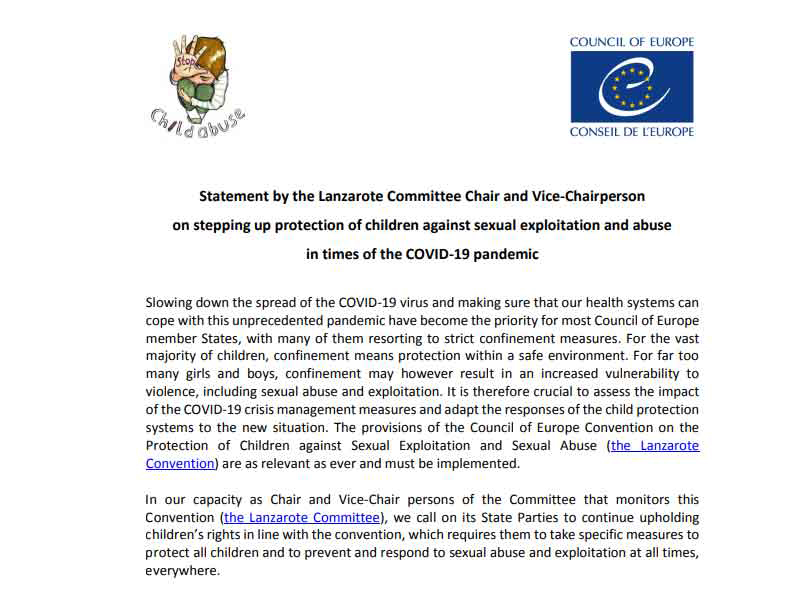Il comunicato del Presidente della Commissione di Lanzarote sul rischio di violenza domestica in periodo di covid
Statement by the Lanzarote Committee Chair and Vice-Chairperson
on stepping up protection of children against sexual exploitation and abuse
in times of the COVID-19 pandemic
Slowing down the spread of the COVID-19 virus and making sure that our health systems can cope with this unprecedented pandemic have become the priority for most Council of Europe member States, with many of them resorting to strict confinement measures. For the vast majority of children, confinement means protection within a safe environment. For far too many girls and boys, confinement may however result in an increased vulnerability to violence, including sexual abuse and exploitation. It is therefore crucial to assess the impact of the COVID-19 crisis management measures and adapt the responses of the child protection systems to the new situation. The provisions of the Council of Europe Convention on the
Protection of Children against Sexual Exploitation and Sexual Abuse (the Lanzarote Convention) are as relevant as ever and must be implemented.
In our capacity as Chair and Vice-Chair persons of the Committee that monitors this Convention (the Lanzarote Committee), we call on its State Parties to continue upholding children’s rights in line with the convention, which requires them to take specific measures to protect all children and to prevent and respond to sexual abuse and exploitation at all times, everywhere.
As more and more countries are locked down, it is a tragic fact that many children, notably children in a vulnerable situation because of a mental or physical disability or a situation of dependence, are trapped with their offenders, be it at home, in out-of-home care, in makeshift refugee camps or facilities where they are deprived of liberty. State Parties must ensure that all children are confined in safe environments.
In addition, as a result of the confinement measures, children are increasingly online and dependent on social media to remain in contact with friends, to express feelings, to study, to distract themselves. As highlighted by EUROPOL, sexual offenders are taking advantage of this situation and more children are likely to be groomed online and become victims of sexual extorsion, cyber-bullying or other sexual exploitation facilitated by information and communication technologies. It is critical to raise-awareness also on such increased online risks.
As recently underlined by the Global Partnership to End Violence against Children and UNICEF, together with its partners at the Alliance for Child Protection in Humanitarian Action, the prevention of sexual exploitation and abuse and how to safely report concerns should be
an integral part of all COVID-19 prevention and control measures.
We strongly call on all State Parties to the Lanzarote Convention to ensure that children are informed of their right to protection against sexual violence and of the services and measures in place to achieve this goal. A continuous dialogue between national, regional and local authorities, as well as cooperation with civil society and the private sector, must take place to regularly review the situation, assess needs and adapt measures so that all can continue to fulfil their mission of preventing and combating child sexual exploitation and sexual abuse and caring for the victims of sexual violence.
As intensifying containment measures expose children at heightened risk of abuse, neglect, exploitation and violence, it is of the utmost importance that helplines and hotlines are known to both children and the public at large and that they are made available round the clock, including through online platforms. As the COVID-19 pandemic is also impacting the capacity of these services to respond to the increasing demands, State Parties should make sure that they have the adequate human resources and the equipment so as to leave no call for help unanswered.
Renewed attention should also be drawn to awareness initiatives informing children in a child friendly manner of the assistance and support services, both physical and psychological, they still have a right to access. This can be done by launching online campaigns, circulating at national level existing awareness raising materials to prevent child sexual exploitation and sexual abuse and by drawing attention to help and hotlines which already exist in each State Party.
Parents and caregivers confined with children must be supported in coping with their own emotions and behaviour during this crisis situation. In addition, they should be empowered to prevent and respond to their children’s sexual abuse, including on-line abuse. Communication efforts must aim at raising adults’ awareness on the measures that they can take to protect their own children. Confinement is also an opportunity to strengthen ties and build further trust amongst family members.
The Council of Europe has developed a series of awareness raising material which can also be used and is available on a special dedicated webpage in many languages at: https://www.coe.int/en/web/children/covid-19
We are aware that several national administrations and non-governmental actors are struggling to respond to the specific challenges this pandemic presents to end sexual violence against children. We strongly encourage all members and observers in the Lanzarote Committee to continue their efforts and share the initiatives taken so far with lanzarote.committee@coe.int to enable us to learn from each other and strengthen our
collective capacity to end sexual violence against children. The Council of Europe will regularly update its webpage dedicated to Coronavirus and children with lessons learned and advice coming from Europe and beyond.
As we fight the COVID-19 pandemic, we should remember that violence against children is another pandemic that makes millions of victims. Let’s fight together both.


